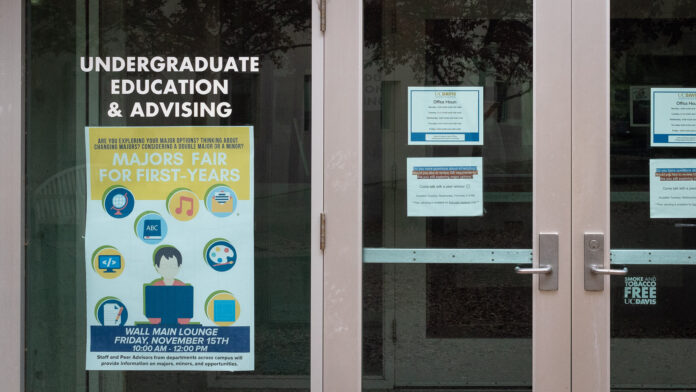A student’s worst nightmare
As the second round of pass times are upon students, many are eagerly attempting to fill the last time slots available to schedule appointments with academic advisors. For some students, however, quarterly meetings with academic advisors have done them more harm than good.
Common issues with advisors for several UC Davis students include receiving the wrong information about which classes to take, experiencing poor time management and facing negligence — among other matters.
One major complaint cited by Alice Sokolova, a second-year biomedical engineering major, is advisors’ poor consideration of her time. She explained that trips to her major advisor made her feel as if her time wasn’t considered and that, in the time she spent in advising, she received little, if any, useful counsel.
“You come for your time and just end up waiting for half an hour for the previous student to have their questions answered,” Sokolova said. “Then, you finally get your chance at talking to them, and the advice is ‘look it up on the school webpage.’”
According to the National Survey of Student Engagement’s (NSSE) 2019 survey of freshman and senior university students, 41% of college freshmen and 37% of college seniors consider their academic counselors as a valuable academic resource. Another significant percentage of students prefer reaching out to their classmates or family members for academic advice. Additionally, The New York Times reports that students attending larger research universities are more likely to rate their experience with their academic advisors as relatively unsatisfactory.
Sokolova said academic advisors should be more diligent with availability, as there are many students whose questions need answering.
Nevertheless, poor academic counsel is not a new issue. Whether attending university or high school, in regards to advisor negligence in particular, many students and their families have taken matters to the courts.
In the 2001 court case Sain vs. Cedar Rapids Community School District, Jefferson High School student and basketball player Bruce Sain sued his school district and academic counselor. Sain claimed his advisor provided false information about the classes that would satisfy his remaining English credit. Sain subsequently lost his basketball scholarship and was unable to play Division I basketball after the NCAA informed him that the class he took did not satisfy the requirement. The district court dismissed the case.
Another instance occurred in 2003, when student Ryan Scott also lost his college scholarship after taking a course his academic advisor assured him would meet course requirements. He later discovered that the class did not. The trial court dismissed Scott’s complaint.
With these allegations of poor performances by major academic advisors, a shift toward peer advising might be a better fit for some. Some peer advisors have taken the same courses or directions as counsel-seeking students and students might find them to be more accessible.
But even peer advising isn’t a perfect solution. Sarah Underwood, a third-year pharmaceutical chemistry transfer student, said she found her peer advisor to be unhelpful when it came to planning her future as a transfer student.
“I was expecting more from UC Davis,” Underwood said. “The peer advisor gave incorrect information and barely looked at my transcripts to see what I already had credit for. I did not feel that I was receiving helpful advice.”
Underwood said her peer advisor didn’t take her individual case into consideration. While attending a university as expensive as UC Davis, she said, students cannot afford to waste time taking classes that do not contribute to graduation requirements.
Underwood said she found more support from her major advisor.
One second-year biological sciences major, who requested to remain anonymous, encourages students to do their own independent research when it comes to general education requirements and class planning.
“Research on your own, don’t just 100% trust the advisors,” they said. “It’s also good to get more than one opinion, so maybe try to see multiple advisors or also go to peer advising or just ask friends/classmates from your major or with similar career goals.”
Written by: Alana Wikkeling — features@theaggie.org






I get the impression that most advisers only take on the job because they haven’t found something better yet. They don’t stick around long and they never really get to know the system as well as they should. Perhaps reallocating funds away from useless nonsense (of which there is plenty) and into better salaries for advisers might draw in better and/or longer-term people.